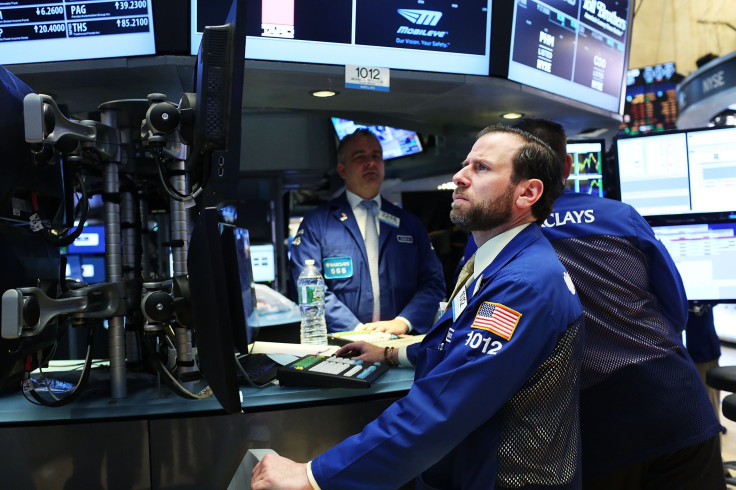Dow Jones Industrial Average Falls As China Posts Bleak Export Data, Battering Stocks Linked To Commodities

This story was updated at 4:10 p.m. EST.
U.S. stocks wavered Tuesday after China’s trade data release raised fresh concerns about slowing growth in the world’s second-largest economy, driving commodity prices lower. European markets were struggling to end the day higher, while Asian markets finished the day mostly in negative territory.
China said Tuesday its exports plummeted more than 25 percent in February compared with the same month last year, much lower than the plunge of 15 percent that economists expected and the lowest level since May 2009. Imports dropped almost 14 percent.
“The numbers were quite galling, particularly for exports, which points back to European/global demand,” Stephen Guilfoyle, head of New York Stock Exchange floor operations at Deep Value Execution Services, said in a morning note.
The Dow Jones Industrial Average (INDEXDJX:.DJI) closed down 109.78 points, or 0.64 percent, to 16,964 on Tuesday. The broader Standard & Poor's 500 index (INDEXSP:.INX) dropped 22.50 points, or 1.12 percent, to 1,979. The Nasdaq composite (INDEXNASDAQ:.IXIC) fell 59.43 points, or 1.26 percent, to 4,649.
The Dow and the S&P eked out small gains Monday to close at their highest levels since early January after a three-week rally, the equity market’s longest since October.
The benchmark U.S. 10-year Treasury settled lower Tuesday, at 1.85 percent, compared with its previous close of 1.92 percent. The bond yield typically rises when investors are more confident about the markets and falls when concerns flare. Gold, another so-called safe-harbor investment, dropped 0.17 percent to $1,261.90. Gold prices tend to rise as confidence in the markets falls. The price of the precious metal hit a 13-month high earlier in the day after the release of the weak China trade data.
Oil prices were eking out slight advances following their steep rise in the previous session. Oil futures trading was initially pulled down by remarks by Kuwait’s oil minister warning that his country wouldn’t agree to an output freeze unless every major oil producer was on board, including Iran. Monday, OPEC member Ecuador said Latin American oil producers would meet Friday to discuss coordinating a strategy to tackle the oil glut that’s battering their economies.
Energy prices need to fall further, Goldman Sachs Group Inc. said in a note Tuesday, before the supply and demand situation rebalances. “Otherwise, an oil price rally will prove self-defeating, as it did last spring,” the bank said.
U.S. West Texas Intermediate (WTI), the major American benchmark, lost 4.35 percent to $36.25 per barrel for April delivery on the New York Mercantile Exchange. Brent crude, the major global benchmark, lost 3.43 percent to $39.44 for May delivery on the London ICE Futures Exchange.
Major world markets were down following the release of China’s trade data and despite German industrial production showing its first rise in three months and its biggest increase since September 2009. Asian stocks got a slight boost after Japan reported revised fourth-quarter data showing the contraction wasn’t as bad as indicated by the preliminary figure released last month.
Julian Evans-Pritchard, China economist at Capital Economics, said in a note Tuesday that China’s dismal trade data could improve in the coming months. “Exports are likely to remain subdued but should benefit from a slight increase in global growth this year,” he said. “This year’s looser fiscal stance, announced over the weekend at the National People’s Congress, should also provide some support to import demand.”
China’s CSI 300 Index of the mainland’s largest equities closed Tuesday up 0.09 percent at 3,108. Hong Kong’s Hang Seng was down 0.73 percent at 20,012. Japan’s Nikkei lost 0.76 percent to 16,783. Australia’s S&P/ASX 200 shed 0.68 percent at 5,108, while South Korea’s main Kospi index dropped 0.6 percent at 1,946.
European shares were down as the positive German economic data was offset by a battering of British mining stocks after China’s data capped a recent rally in commodities. The broad Stoxx Europe 600 index fell 0.98 percent to 337.59 on Tuesday. The Paris-based CAC 40 lost 0.86 percent to 4,404, while London’s FTSE shed 0.92 percent to 6,125. Frankfurt’s DAX slipped 0.88 percent to 9,693.
Shares in Anglo American PLC (LON:AAL), the world’s largest mining company, plummeted more than 15 percent on Tuesday. Stock in Anglo American’s rival Rio Tinto PLC (LON:RIO) dropped nearly 7 percent. Stock in commodity trading giant Glencore PLC (LON:GLEN) fell more than 18 percent.
© Copyright IBTimes 2024. All rights reserved.






















